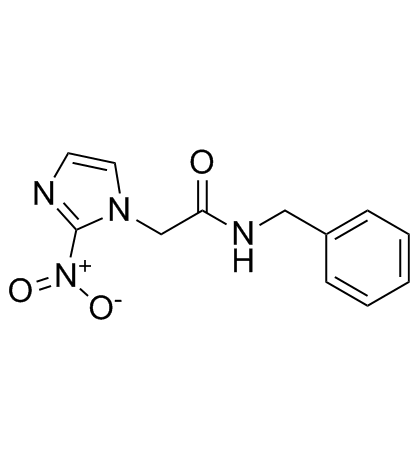苄硝唑

苄硝唑结构式

|
常用名 | 苄硝唑 | 英文名 | Benznidazole |
|---|---|---|---|---|
| CAS号 | 22994-85-0 | 分子量 | 260.24900 | |
| 密度 | 1.35g/cm3 | 沸点 | N/A | |
| 分子式 | C12H12N4O3 | 熔点 | 189-192ºC(lit.) | |
| MSDS | 中文版 美版 | 闪点 | N/A | |
| 符号 |

GHS07 |
信号词 | Warning |
|
Targeting the substrate preference of a type I nitroreductase to develop antitrypanosomal quinone-based prodrugs.
Antimicrob. Agents Chemother. 56(11) , 5821-30, (2012) Nitroheterocyclic prodrugs are used to treat infections caused by Trypanosoma cruzi and Trypanosoma brucei. A key component in selectivity involves a specific activation step mediated by a protein homologous with type I nitroreductases, enzymes found predomin... |
|
|
Microsatellite and mini-exon analysis of Mexican human DTU I Trypanosoma cruzi strains and their susceptibility to nifurtimox and benznidazole.
Vector Borne Zoonotic Dis. 13(3) , 181-7, (2013) Chagas disease is caused by the protozoan parasite Trypanosoma cruzi, and it affects as many as 10 million people in North and South America, where it represents a major public health problem. T. cruzi is a parasite with high genetic diversity, and it has bee... |
|
|
Immunosuppression and Chagas disease: a management challenge.
PLoS Negl. Trop. Dis. 7(1) , e1965, (2013) Immunosuppression, which has become an increasingly relevant clinical condition in the last 50 years, modifies the natural history of Trypanosoma cruzi infection in most patients with Chagas disease. The main goal in this setting is to prevent the consequence... |
|
|
Evaluation of benznidazole treatment combined with nifurtimox, posaconazole or AmBisome® in mice infected with Trypanosoma cruzi strains
Int. J. Antimicrob. Agents 40(6) , 527-32, (2012) The present work aimed to investigate the curative effect of benznidazole (BZL) in combination with other patented drugs [nifurtimox (NFX), posaconazole (POS) or AmBisome® (AMB)] in mice acutely or chronically infected with either a BZL-susceptible (Tulahuen)... |
|
|
Modulated dissolution rate from the inclusion complex of antichagasic benznidazole and cyclodextrin using hydrophilic polymer.
Pharm. Dev. Technol. 18(5) , 1035-41, (2013) Benznidazole (BNZ) is the primary chemotherapeutic agent for treating Chagas' disease; however, its poor water solubility and irregular oral absorption lead to the treatment failure in the chronic phase. The aim of this work was to investigate the utility of ... |
|
|
Molecular characterization of Cyclophilin (TcCyP19) in Trypanosoma cruzi populations susceptible and resistant to benznidazole.
Exp. Parasitol. 148 , 73-80, (2015) Cyclophilin (CyP), a peptidyl-prolyl cis/trans isomerase, is a key molecule with diverse biological functions that include roles in molecular chaperoning, stress response, immune modulation, and signal transduction. In this respect, CyP could serve as a poten... |
|
|
Trypanosoma cruzi chemical proteomics using immobilized benznidazole.
Exp. Parasitol. 140 , 33-8, (2014) Benznidazole (Bzn) is a nitroimidazole drug currently used as first line treatment against Chagas disease, a neglected tropical disease caused by the flagellated protozoan Trypanosoma cruzi. Although the drug has been used since the late 1960s, its mechanism ... |
|
|
An essential type I nitroreductase from Leishmania major can be used to activate leishmanicidal prodrugs.
J. Biol. Chem. 288(40) , 28466-76, (2013) Nitroaromatic prodrugs are used to treat a range of microbial infections with selectivity achieved by specific activation reactions. For trypanosomatid parasites, this is mediated by type I nitroreductases. Here, we demonstrate that the causative agent of lei... |
|
|
Unveiling benznidazole's mechanism of action through overexpression of DNA repair proteins in Trypanosoma cruzi.
Environ. Mol. Mutagen. 55(4) , 309-21, (2014) Benznidazole (BZ) is the most commonly used drug for the treatment of Chagas disease. Although BZ is known to induce the formation of free radicals and electrophilic metabolites within the parasite Trypanosoma cruzi, its precise mechanisms of action are still... |
|
|
Efficacy of novel benznidazole solutions during the experimental infection with Trypanosoma cruzi.
Parasitol. Int. 62(1) , 79-81, (2013) Chagas' disease is caused by the protozoan parasite Trypanosoma cruzi. About 8 million people throughout Latin America are infected causing approximately 10,000 deaths annually. Benznidazole, available as unique 100 mg tablets in many of the endemic countries... |